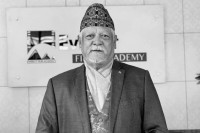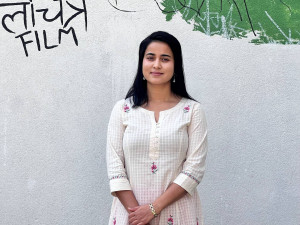Culture & Lifestyle
If your intention is pure, the universe becomes your co-author
A former international cabin crew turned award-winning author and travel blogger, KaranVeer Gauttam, blends wanderlust, wellness, and wisdom through his journeys across 100+ countries.
Reeva Khanal
KaranVeer Gauttam’s story is one of transformation. A traveller who has visited over a hundred countries, he once worked as an international cabin crew member. Today, he inspires others as a travel and food blogger, animal advocate, and author of ‘NUSQE—The Untold Story of 1.5 Billion Indians’.
Through his stories, Gauttam shares more than just places—he tells of the people, food, and cultures that make them special. ‘NUSQE’ was recently honoured with the Best Debut Author Award at the Nepal Authors Award 2025 in Kathmandu on November 1.
In this conversation with Post’s Reeva Khanal, Gauttam reflects on his path of self-discovery and the spiritual energy behind his work. He shares insights on blending purpose with passion and how ‘NUSQE’ became more than just a book.
You’ve travelled to over 100 countries and transitioned from being a cabin crew to a travel and food blogger and author. What inspired this journey?
This journey shaped itself beautifully. Being a cabin crew member allowed me to explore many cultures, festivals, people, and stories. Once, a monk in Japan gave me a prophecy that I would travel the world. That moment planted a seed in me. I made it my dream to visit 100 countries, which I achieved last year.
With travel came food, and I realised how every country tells its story through its cuisine. Being a travel and food blogger opened up a whole new world—one where I could share not just my stories, but also the stories of others.
Then came the pandemic, and during that pause, ‘NUSQE’ was born. ‘NUSQE’ is a modern-day shastra—a guide rooted in ancient Indian wisdom, meant to heal and help our world.
‘NUSQE’ explores the untold stories of India. What inspired you to write about these hidden chapters of Indian heritage?
This book was born when the world searched for immunity and people returned to home remedies. I was in China when Covid-19 broke out—and somehow never contracted it. I jokingly credited my grandparents’ traditional remedies, the nuske (recipe/formula), which had been protecting us long before modern medicine. Realising that no one had documented these practices in one book, I wrote ‘NUSQE’ as a tribute to our ancestors.
How did your experiences travelling and interacting with different cultures influence the content of ‘NUSQE’?
This book is a journey—it has 22 chapters, each set in a different city across India, and a few in other countries. Every chapter unfolds like a travel diary, blending stories, people, traditions, and remedies.
In ‘NUSQE’, there are people I met during my travels—from monks in Japan to healers in Bali, from herbal masters in Nepal to grandmothers in Rajasthan. Each shared a piece of ancient wisdom, a simple nusqa, that became part of the book.
Travel didn’t just influence the book—it shaped its soul. Every culture I encountered taught me that healing is universal—whether it’s a Japanese tea ceremony, a Moroccan spice blend, or Indian turmeric milk. I realised that while traditions differ, the intention behind them is the same: to nurture, protect, and heal.
Animal advocacy is a key part of your work. How do you incorporate this passion into your travels and storytelling?
I’ve always felt a divine connection with animals and birds. I’ve never felt fear around them; in fact, I feel drawn to their energy, like there’s an unspoken bond.
This year has been especially magical—walking alongside wild lions in South Africa, playing with the prehistoric shoebill bird in Uganda, hugging a wild chimpanzee in Congo, holding a panda in China, standing cloaked with an owl in Scotland, swimming with turtles in the Philippines, and meeting the ever-curious kangaroos in Australia.
Each animal has its own personality, wisdom, and vibration. When you truly observe them, you start understanding life differently—patience from a lion, freedom from a bird, innocence from a panda.
Through my travels and storytelling, I try to share not just their beauty but also their message. My goal is to create awareness, inspire empathy, and encourage people to stop hunting and start loving these magnificent beings.
Looking back on your journey, what advice would you give to aspiring writers or travellers?
My advice to aspiring writers is simple: don’t wait—start writing, and share it. There’s no such thing as a perfect time. Every day is beautiful, and the world is waiting to hear your story. As for travel—it’s the most beautiful distraction. When I travel, I forget everything and everyone; I become a student again—learning from people, food, places, and cultures.
I’ve completed 100 countries so far, and my dream is to be the first Indian to visit all 197 countries—97 more to go! But travel doesn’t have to mean crossing borders. Even a town nearby can teach you something new. So keep travelling, keep writing—and keep believing. Because when your intention is pure, the universe becomes your co-author.
Are there any upcoming projects or new directions in writing, travel, or content creation that you’re excited about?
Yes, a few exciting projects are in motion. My next book is a novel based on India’s call centre culture. It dives into the lives, dreams, and emotions of those behind the headset.
I’m also launching a web comic series called ‘NUSQEMAN’—India’s first superhero born from ‘NUSQE’. Nusqeman fights diseases and spreads wellness through ancient Indian wisdom—a fun, and witty take on health and humanity.
My third book is different—‘True Ghost Stories of a Flight Attendant’. It’s a travel-horror collection that takes readers across countries and cultures through eerie real-life encounters in the skies.
My team and I are also developing a YouTube series, ‘Temples of India’, exploring the spiritual energy and untold legends of India’s sacred places. Soon after, I’ll head to South America for a culinary and cultural adventure—a dream I’ve long been waiting for.
KaranVeer Gauttam’s five book recommendations
Wabi Sabi
Author: Beth Kempton
Publisher: HarperCollins (Piatkus)
Year: 2018
This book encourages readers to embrace imperfection and simplicity through the Japanese aesthetic of wabi sabi.
The Yogi Plate
Author: Radhavallabha Das
Publisher: Penguin / Ebury Press
Year: 2021
A former monk and chef explains how sattvic (pure) food and Ayurvedic principles can nourish the body and mind.
Dongri to Dubai
Author: S Hussain Zaidi
Publisher: Roli Books
Year: 2012
A gripping non‑fiction that traces the evolution of organised crime in Mumbai, reflecting the city’s darker underbelly.
Myth = Mithya
Author: Devdutt Pattanaik
Publisher: Penguin India
Year: 2006
An exploration of Hindu myths, gods and symbols—decoding the relevance of ancient stories to modern life.
The Alchemist
Author: Paulo Coelho
Publisher: HarperCollins
Year: 1988
This is a timeless allegory of following one’s dreams, listening to one’s heart, and trusting the journey.




 9.12°C Kathmandu
9.12°C Kathmandu















